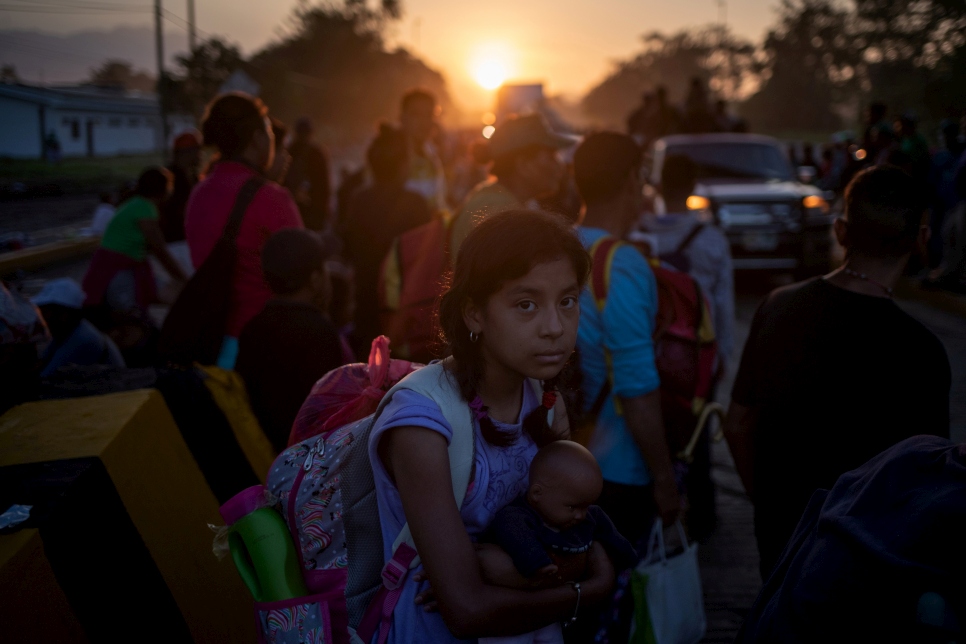Displacement in Central America
The stark choice for thousands of families and young women and men in Central America now is to leave or die. They are compelled to leave their homes and risk their lives undertaking dangerous journeys, only to search for a safe place to live. They often arrive only with the clothes they are wearing, traumatized and in need of urgent support.
“We had our own bakery in El Salvador, until gangs arrived, and we could no longer sell bread. We were threatened out of our country.”
Raul*, 65, fled with his family from El Salvador to neighbouring Guatemala
Growing numbers of people in Central America are being forced to leave their homes. Worldwide, there are now around 387,000 refugees and asylum-seekers from El Salvador, Guatemala and Honduras – a figure that has been climbing at an annual rate of 24 per cent. Compounded by socio-economic instability and poverty, they are escaping gang violence, threats, extortion, recruitment into gangs or prostitution, as well as sexual and gender-based violence (SGBV). Lesbian, gay, bisexual, transgender and intersex people – collectively known as LGBTI – are also fleeing persecution. Many more are displaced more than once within their own countries or have been deported back home, often into dangerous situations.
Political turmoil in Nicaragua since April 2018 has meanwhile led tens of thousands of people to flee violence and human rights violations, the majority into neighbouring Costa Rica. Well over a year into the crisis, more than 88,000 Nicaraguans have left their country in search of a safe haven.
Overall, more than 470,000 people from the NCA and Nicaragua have been uprooted from their homes. Host countries and communities in Belize, Costa Rica, El Salvador, Guatemala, Honduras, Mexico and Panama, have been doing their best to welcome those forced to flee; over 100,000 in 2019 alone. With new policies to regularize their stay and allow for their speedy integration, thousands of people have been able to begin their lives anew. Yet the growing number of people seeking safety is overstretching their hosts’ capacity to cope, straining limited services that also serve the local population.
“This project to me means hope. Even though we had to leave our country, we have the chance to make one dream come true in our lives.”
Isabel, 56, from Honduras who is becoming self-reliant thanks to a Government and private-sector employability project in Guatemala
What is UNHCR doing to help?
Everyone has the right to live in safety. No one should be forced to leave everything behind, to face unfathomable tragedies or to lose their own lives, to find a safe haven. Everyone who fears violence and persecution in their home country has the right to seek asylum, and we work tirelessly across Central America so they can enforce it.
UNHCR works with the seven governments leading the Comprehensive Regional Protection and Solutions Framework (MIRPS), a new and pioneering approach to help displaced people thrive, not just to survive, in the spirit of the Global Compact on Refugees and the Sustainable Development Goals.
We work closely with partners, including the civil society and parishes, in high-risk and displaced communities to increase their resilience and support those who had no other choice but to flee. We are also encouraging solutions for internally displaced people, refugees, asylum-seekers and deportees with protection needs from the NCA and Nicaragua.
To this end, we strive to help enhance the capacity of refugee-receiving countries to provide access to fair and efficient refugee status determination procedures. We are supporting safe space networks and shelters across Central America and Mexico so that immediate assistance is available to people on the move and that those in need of international protection are identified.
We also work with other humanitarian and development agencies to make sure we reach everyone in countries of origin, including through programmes that seek to empower internally displaced people, children, women, deportees with protection needs, LGTBI people and others affected by violence. We provide life-saving support and cash grants to help displaced people cope.
Furthermore, we promote the local integration of refugees and asylum-seekers in their host countries and help them to use their skills or learn new ones. We are also investing in efforts to curb xenophobia and promote peaceful coexistence among the displaced and their hosts.
“I have always been a fighter. I will not stay put and watch my life pass before me.”
Sara*, a 29-year-old mother and a professional in the production and distribution of food, fled to Guatemala with her husband and baby. She had joined the protests in Nicaragua and feared for her family’s safety.
To carry out this work, UNHCR needs a total of US$91.5 million in 2019 to continue responding to the immediate and persistent needs of internally displaced people, asylum-seekers, refugees and deportees from NCA and Nicaragua. These activities span the seven countries most affected, namely Belize, Costa Rica, El Salvador, Guatemala, Honduras, Panama and Mexico.
Documents and reports
- Expanding operations in Central America 2019
- Local integration and livelihoods
- Community strengthening
- SGBV and Child Protection
- Protection Transfer Arrangement programme (PTA)
- Protection and safe spaces network
- Cash based interventions and assistance
- Strengthening asylum systems
- Characterization of internal displacement in Honduras
- Profiling study on internal mobility due to violence in El Salvador

